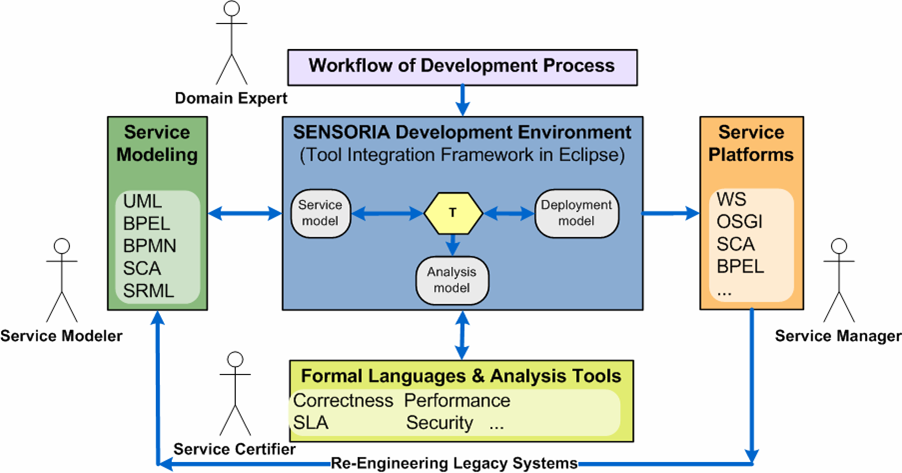Software Engineering in Service-Oriented Overlay Computers (SENSORIA)

Service-oriented computing is an emerging paradigm where services are understood as autonomous, platform-independent computational entities that can be described, published, categorised, discovered, and dynamically assembled for developing massively distributed, interoperable, evolvable systems and applications. These characteristics pushed service-oriented computing towards nowadays widespread success, demonstrated by the fact that many large companies invested a lot of efforts and resources to promote service delivery on a variety of computing platforms, mostly through the Internet in the form of Web services. Tomorrow, there will be a plethora of new services as required for e-government, e-business, and e-science, and other areas within the rapidly evolving Information Society.
The aim of SENSORIA is to develop a novel comprehensive approach to the engineering of software systems for service-oriented overlay computers where foundational theories, techniques and methods are fully integrated in a pragmatic software engineering approach. It will focus on global services that are context adaptive, personalisable, and may require hard and soft constraints on resources and performance, and will take into account the fact that services have to be deployed on different, possibly interoperating, global computers, to provide novel and reusable service-oriented overlay computers.
EU IP Project #IST-016004
Period:
2005 - 2010
Participants:
The partners of this project are:
- Ludwig-Maximilians-Universitat München (Co-ordinator)
- Università di Trento
- University of Leicester
- Warsaw University
- Technical University of Denmark at Lyngby
- Università di Pisa
- Università di Firenze
- Università di Bologna
- Istituto di Scienza e Tecnologie della Informazione "A. Faedo"
- University of Lisbon
- University of Edinburgh
- ATX Software SA
- Telecom Italia S.p.A.
- Imperial College London (London Software Systems)
- FAST GmbH
- Budapest University of Technology and Economics
- S&N AG
Project aim:
Service-oriented computing is an emerging paradigm where services are understood as autonomous, platform-independent computational entities that can be described, published, categorised, discovered, and dynamically assembled for developing massively distributed, interoperable, evolvable systems and applications. These characteristics pushed service-oriented computing towards nowadays widespread success, demonstrated by the fact that many large companies invested a lot of efforts and resources to promote service delivery on a variety of computing platforms, mostly through the Internet in the form of Web services. Tomorrow, there will be a plethora of new services as required for e-government, e-business, and e-science, and other areas within the rapidly evolving Information Society.
The aim of SENSORIA is to develop a novel comprehensive approach to the engineering of software systems for service-oriented overlay computers where foundational theories, techniques and methods are fully integrated in a pragmatic software engineering approach. It will focus on global services that are context adaptive, personalisable, and may require hard and soft constraints on resources and performance, and will take into account the fact that services have to be deployed on different, possibly interoperating, global computers, to provide novel and reusable service-oriented overlay computers.
The results of SENSORIA will include a new generalised concept of service for global overlay computers, new semantically well-defined modelling and programming primitives for services, new powerful mathematical analysis and verification techniques and tools for system behaviour and quality of service properties, and novel model-based transformation and development techniques. The innovative methods of SENSORIA will be demonstrated by applying them in the service-intensive areas of e-business, automotive systems, and telecommunications.
Further information: András Pataricza, Ph.D.



